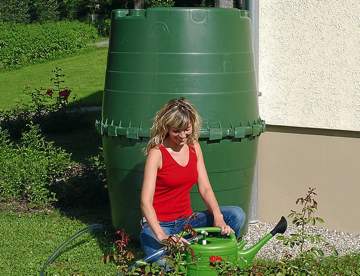
As a crippling drought grips much of the Southern and Southwestern United States, the population continues to grow and water resources become scarcer. In Tucson residents will soon hand cash rebates to residents who install home rainwater-harvesting systems — a technique well-known to off-grid homeowners, which is now entering the mainstream.
The City Council approved $100,000 pilot program Tuesday that will be the precursor for a rebate system intended to go into effect next year.Rebates could be in the range of $850, said interim Water Director Andrew Quigley, which, in a far-sighted move, is the amount the city currently rebates for gray-water systems. Rainwater harvesting captures rainwater for use on a property, while gray-water harvesting reuses water from washing machines, sinks, showers and bathtubs for irrigation.
The rebates are not expected to begin until July 2012, because Tucson Water which spent $23,000 setting up a similar gray- water-harvesting rebate program, is now spending $100,000 to set up the rainwater program.
In the United States, a typical water-harvesting system can cost between $2,500 and $4,500, said Lincoln Perino, who installs them in Tucson for Technicians for Sustainability.
Perino said people want to put in rainwater-harvesting systems but are concerned about the price. “The will is there, but they need the economic push to get them over the edge.”
The city will have to determine what constitutes a water- harvesting system to qualify for the rebate. Quigley said the systems will at a minimum have to capture rainwater and deliver it for a beneficial use on a property.
Tucson, AZ: Harvesting Desert Rain
In a new paper to be presented at the 2011 ASME International Mechanical Engineering Congress and Exposition, John Whear, biomedical engineer at the Cancer Therapy & Research Center at The University of Texas Health Science Center at San Antonio, examines how to manage rainwater as a common pool resource. Whear studied management techniques for other common pool resources like fisheries and forests, as well as organizations developed for sharing scarce water, such as the Edwards Aquifer Authority and social systems in pre-colonial India.
Drawing from game theory, Whear argues that a successful common pool resource (CPR) depends on participant behavior, which requires monitoring and management. Effective monitoring can be made simple with the technology available today, he said.
Along with reducing pressure on ground and surface water supplies, Whear proposes that large-scale rainwater harvesting (RWH) systems can also lesson the threat of deadly flash flooding common to urban areas in Central and South Texas.
By catching large amounts of the fast-falling rainwater and draining it slowly over several days, the RWH systems can decrease runoff and increase the amount that is absorbed into the ground and recharge zones.
“Once recharge can be determined with an adequate degree of certainty, the acquired data could be used for the economic benefit of participants,” Whear said. “Possibilities include a flood control tax abatement and aquifer recharge credit.”
Whear first presented a rainwater harvesting paper last year at the 2010 ASME conference. In that paper he examined the options for distributing harvested rainwater and began contacting water management organizations.
“That’s when I learned that rainwater harvesting is as much a social issue as it is an engineering one,” he said.
powkey Portable Power Station 350W, 260Wh/70,000mAh Backup Lithium Battery, 110V Pure Sine Wave Power Bank with 2 AC Outlets, Portable Generator for Outdoors Camping Travel Hunting Emergency
Now retrieving the rating.
$192.98 (as of April 24, 2024 13:58 GMT +01:00 - More infoProduct prices and availability are accurate as of the date/time indicated and are subject to change. Any price and availability information displayed on [relevant Amazon Site(s), as applicable] at the time of purchase will apply to the purchase of this product.)Amazon Visa
Now retrieving the rating.
$23.00 (as of April 24, 2024 13:58 GMT +01:00 - More infoProduct prices and availability are accurate as of the date/time indicated and are subject to change. Any price and availability information displayed on [relevant Amazon Site(s), as applicable] at the time of purchase will apply to the purchase of this product.)200W Portable Power Station, Powkey 120Wh/33,000mAh Power Bank with AC Outlet, 110V 6 Outputs Solar Generator External Battery Pack with LED Light for Home Use and Outdoor Camping
Now retrieving the rating.
31% OffAnker Power Bank Power Station 60,000mAh,Portable Outdoor Generator 87W with Smart Digital Display, Retractable Auto Lighting and SOS Mode, Home Backup(PowerCore Reserve 192Wh) for Travel, Camping
Now retrieving the rating.
$149.99 (as of April 24, 2024 13:58 GMT +01:00 - More infoProduct prices and availability are accurate as of the date/time indicated and are subject to change. Any price and availability information displayed on [relevant Amazon Site(s), as applicable] at the time of purchase will apply to the purchase of this product.)Foldable Solar Panel Charger 60W with 18V DC Output (11 Connectors) for 100W~350W Portable Power Stations Jackery/Rockpals/Flashfish/Enginstar, Portable Solar Generator for Outdoor Camping Van RV Trip
Now retrieving the rating.
$98.99 (as of April 24, 2024 13:58 GMT +01:00 - More infoProduct prices and availability are accurate as of the date/time indicated and are subject to change. Any price and availability information displayed on [relevant Amazon Site(s), as applicable] at the time of purchase will apply to the purchase of this product.)





